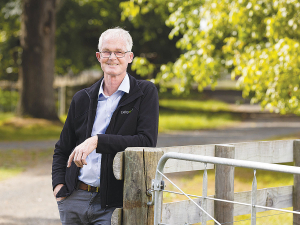DairyNZ Levy Vote Underway as Chair Highlights Seven-Fold Return
Voting has started for the renewal of DairyNZ's milksolids levy.
 Dairy NZ chair Jim van der Poel says it’s important for the incoming government to keep tight control of its spending.
Dairy NZ chair Jim van der Poel says it’s important for the incoming government to keep tight control of its spending.
Dairy farmers want the incoming government to keep a tight control of its own spending and avoid contributing to inflationary pressures.
That’s one of the key messages of View from the Cowshed – results from a survey carried out by DairyNZ to give politicians a snapshot of farmer concerns.
DairyNZ chair Jim van der Poel told Rural News that he wasn’t surprised by concerns raised by farmers.
He points out that like all Kiwis and small business owners, dairy farmers have been feeling the effects of rising costs. Coupled with the recent forecast cuts in milk price, many will now be thinking about their business viability.
The survey shows farmers being very concerned about the impact of inflation and regulations for some time now. Van der Poel says the recent fall in the farmgate milk price will have only added to their concerns.
In the View from the Cowshed survey, almost 75% of dairy farmers report experiencing cost increases of over 20% in the past year alone. Van der Poel says many farmers will be struggling to make ends meet and are focused on minimising losses this year.
“Therefore, it is important for the incoming government to keep tight control of its own spending and avoid contributing to inflationary pressures.
“It’s vital we support farmers to succeed, given their significant contribution to local communities and economies, with dairy projected to generate over $25 billion in export revenue this year alone.”
Another key concern for farmers is changing regulations: 65% of dairy farmers say changing regulations are a key challenge. They’re concerned about unpractical regulations (72%), too much change at once (69%) and the speed of change (64%).
Van der Poel says excessive and impracticable regulatory requirements are negatively impacting farmers’ wellbeing and their farming businesses. “They are creating real frustrations.”
DairyNZ is calling on all political parties to commit to an independent regulatory review panel, made up of experienced farmers from across the primary sector.
It wants them to review proposed regulations that impact farmers and ensure they are necessary, practical, cost effective and will achieve desired outcomes.
The survey also highlights the pressing need to resolve workforce challenges, including staff shortages and retention. A total of 26% of farmers say they don’t have enough staff to meet their needs, while 29% are never or rarely able to find staff with the skills and experience they need.
DairyNZ wants policymakers to continue collaborating with sector organisations as it works to improve recruitment and retention of farm staff. This includes supporting flexible immigration policies and the sector’s Great Futures in Dairying Plan (designed to improve workplaces and workforce).
“In many ways, we want the same things as other Kiwis – a solution to the crippling rates of inflation and workers to fill vacancies,” says van der Poel.
Two kiwifruit orchards in the Bay of Plenty and one in Northland are this year's finalists for the Ahuwhenua Trophy competition.
The Government's chief science advisor, Dr John Roche says the key objective for the science sector in the coming year is bedding down the reforms which sees the merger of the previous entities.
Hawke's Bay apple grower Taylor Corporation says a standout 2026 season, coming after a few difficult years, is boosting optimism among growers.
Horticulture New Zealand (HortNZ) has added its perspective to numerous primary sector voices urging the Government to strengthen its draft legislation to replace the Resource Management Act (RMA).
The Commerce Commission has finalised new information disclosure requirements for local councils and water organisations that deliver water supply and wastewater services.
Beef + Lamb NZ (B+LNZ) is calling for significant changes to the Government’s reforms to the Resource Management Act (RMA).

OPINION: The proverbial has really hit the fan in Wellington and exposed a glaring example of a double standard in…
OPINION: Dark suited spin doctors exist to, well, spin, and the nice cuddly progressive types at Greenpeace Aotearoa practice this…